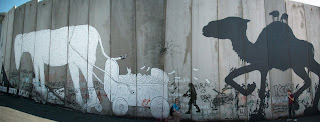


After seeing the wall around Rachel's Tomb we decided to visit the tomb.
Most afternoons our Arabic class ends at 2:30 and we have until 5ish before we need to go home (and then head out for our evening program). The Siraj people who came in June have the more advanced Arabic class during this time.
So B, P & I are trying to do mini-trips in this slot.
Rachel's Tomb as the crow flies would be a 15 minute walk from Bethlehem University.
But there's The Wall.
So armed with our trusty American passports and my little map we took off for a place our hosts cannot go.
We walked up toward the main traditional entrance to Bethlehem, along The Wall. Then we came to the security entrance, walking along a single-file ramp which zig-zagged in front of the Wall and went through a security gate & scanner. (Sorry, No photos allowed). this took us out into an area that looked like a big parking lot -- an open sort-of 'no person's zone.' There was hardly anyone around and we thought we were through - surprisingly easily. We asked a man there "How do we get to Rachel's Tomb." He laughed and said it was impossible for us to go there. You have to go to Jerusalem, make an appointment, get on a special bus, then come back. We smiled, and figured he must be talking about the rules for Palestinians, not for us privileged Americans...
We then entered the building on the far side of the no man's land. Again no pictures allowed. We had to go through a series of those one way bar / exit things like on subways. Then we were in a line, with our trusty passports in hand. A voice from somewhere told us when we were allowed through the next barred gate. I was through but B & P were not yet allowed.
I put my backpack on a scanner - was concerned that the loose straps might be caught in the rollers as it went through. Meanwhile, I walked through and showed my passport. The soldier looked and said "You go, Now." But I didn't have my bag. The scanner had stopped with the bag inside. She said again "GO" - but I wanted my bag. And also - I wanted my kids! So I didn't want to go. Again she commanded me to go. Meanwhile, the kids got through another stage behind me, but I still wouldn't leave with them. It was confusing -- and I was stressing, thinking that there was some problem with my bag, and anxious to make sure that B & P would also get through.
Imagine how much more stressful it would be for a nervous Palestinian who knows that just on a whim a soldier can decide to say "No, you can't go today."
Finally we all got through and after passing yet another show the passport-soldier-spot we were out in the open air - technically out of Bethlehem and in Jerusalem. Well - not exactly, in truth, because The Wall and this whole checkpoint and the land on both sides of it is actually all Palestinian and by UN Resolution (and the USA has agreed with this repeatedly) this checkpoint is on stolen occupied land, way over the Green Line into Palestine...
Anyway, now to Rachel's Tomb at last.
Only -- you really can't get there from here.
The Wall doubles back to surround the tomb and surrounds the tomb. The only access to the tomb is by driving along the Jerusalem side of the Wall through a bus or car-only access road. Pedestrians aren't allowed to go there -- we even saw some Hassidic men trying (yes, they wear those Heavy wool overcoats & hats even in July) and they were also denied access while on foot.
So, we didn't get to Rachel's tomb. Instead we went back through the scanners and passport controls -- it is a Lot easier to go out of Israel than in.
Then we took our time walking back, looking at the very creative graffiti on the way.
My favourite one says
"Jesus will tear down this wall."
In the name of justice and peace for both Palestinians and Israelis,
I pray he will soon.











